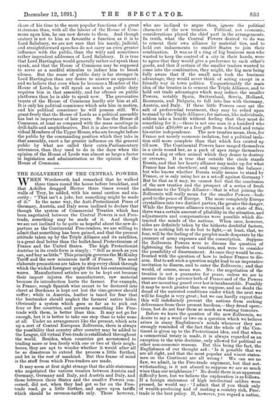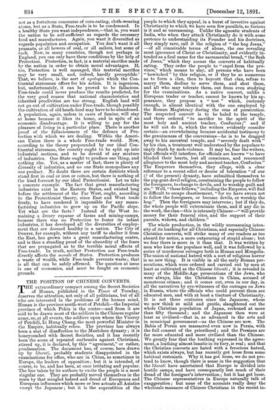THE ZOLLVEREIN OF THE CENTRAL POWERS.
WHEN Wordsworth had remarked that he walked three times round the house before breakfast, and that Achilles dragged Hector three times round the walls of Troy, he added, with his usual caution and sin- cerity: "That isn't a joke, but something might be made of it." In the same way, the Anti-Protectionist Press of Germany, Austria, and Italy seem inclined to declare that though the system of Commercial Treaties which has been negotiated between the Central Powers is not Free- trade, something may be made of it. And though we are not inclined to be quite as hopeful about the new de- parture as the Continental Free-traders, we are willing to admit that something has been gained, and that the present attitude taken up by the Triple Alliance and. its satellites, is a great deal better than the bullet-head Protectionism of France and. the United States. The high Protectionist doctrine in its crude form is simply : 'Sell as much as you tan, and buy as little." This principle governs the McKinley Tariff and. the new minimum tariff of France. The most elaborate precautions are taken to stop every chink through which the wicked foreigner might thrust his contaminating wares. Manufactured articles are to be kept out because their import injures the manufacturer, raw material because its introduction hurts the farmer. For example, in France, rough Spanish wine meant to be doctored into claret at Bordeaux is kept out lest the vine-grower should suffer ; while in America, leather is taxed for fear that the bootmaker should neglect the farmers' native hides. Obviously a system which goes so far as to pick out four or five countries, and permits something like Free- trade with them, is better than this. It may not go far enough, but it is better to take one step than to take none at all. Under an arrangement like the present, which sets up a sort of Central European Zollverein, there is always the possibility that country after country may be added to the League, till virtual Free-trade is established throughout the world. Besides, when countries get accustomed to trading more or less freely with one or two of their neigh- bours, they are apt to wonder whether it would after all be so disastrous to extend the process a little further, and let in the rest of mankind. But this frame of mind is the stuff from which Free-traders are made.
It may seem at first sight strange that the able statesmen who negotiated the various treaties between Austria and Germany, Germany and. Italy, and Austria and Italy, and those between these States and the smaller Powers con- cerned, did. not, when they had got so far on the Free- trade road, go a little further, and agree upon tariffs which should be revenue-tariffs only. Those however, who are inclined to argue thus, ignore the political character of the new treaties. Political, not economic, considerations played the chief part in the arrangements. In truth, what the Central Powers desired to do was to cement their own alliance by material ties, and. to hold out inducements to smaller States to join their combination. It was as if a ring of big business men who wanted to keep the control of a city in their hands, were to agree that they would give a preference to each other's goods and that if certain of the smaller traders wanted to come into the combination, they might, the big men being fully aware that if the small men took the business advantage, they would. never think of acting except in a friendly way in town politics. Unquestionably the main idea of the treaties is to cement the Triple Alliance, and to hold out trade advantages which may induce the smaller Powers, notably Spain, Switzerland, Servia, Holland, Roumania, and Bulgaria, to fall into line with Germany, Austria, and Italy. If these little Powers once eat the salt of preferential treatment, they may be relied upon to stand by the Triple Alliance; for nations, like individuals, seldom take a benefit without feeling that they must do something for it ;—there is not one man in a hundred who could take £10,000 as a free gift from a friend and retain his entire independence. The new treaties mean, then, for France not merely economic isolation, but a political isola- tion still more complete than that which has existed up till now. The Continental Powers have ranged themselves in a circle round her, as a pack of apes range themselves round a dog or other animal which they desire to destroy or overawe. It is true that outside the circle stands Russia, and that her hearty alliance may make up for what France has lost elsewhere, and may redress the balance ; but who knows whether Russia really means to stand by France, or is only using her as a set-off against Germany But be that as it may, we cannot feel that the conclusion of the new treaties and the prospect of a series of fresh adhesions to the Triple Alliance—that is what joining the Zollverein will really mean for the smaller Powers—bode good. to the peace of Europe. The more completely Europe crystallises into two distinct parties, the greater the danger. While the European alliances remained in a state of flux, there was a certain amount of pliability in the situation, and adjustments and compensations were possible which dis- tracted the minds of the nations. When once, however, sides are definitely taken by the hitherto doubtful factors, there is nothing left to do but to fight,—at least, that, we fear, will be the feeling of the peoples made desperate by the pressure of army expenses and. the conscription. Suppose the Zollverein Powers were to discuss the question of lightening the burden of taxation, and were to consider the possibility of disarmament. At once they would be con- fronted with the question of how to induce France to dis- arm. But to ask such a question might lead to an imperative invitation to disarm, and to enter the Zollverein ; and that would, of course, mean war. No; the negotiation of the treaties is not a guarantee for peace, unless we are to assume that the patience both of France and of the Powers that are mounting guard over her is inexhaustible. Possibly it may be much greater than we suppose, and no doubt the dread of the untested conditions under which the next war will be fought is very great ; but we can hardly expect that this will indefinitely prevent the nations from seeking deliverance from their present burdens,—they dread opere- tions, but do not fear them so much as wasting tumours. Before we leave the question of the new Zollverein, we desire to say a word or two on a question which we believe arises in many Englishmen's minds whenever they are strongly reminded of the fact that the whole of the Con- tinent is given up to the Protectionist idea, and that when a commercial treaty is made, it is always regarded as an exception to the true doctrine, only allowed for political or other non-economic reasons. But this being the fact, the Englishmen of our thought ask : Is it possible that we are all right, and that the most popular and wisest states- men on the Continent are all wrong ? We can see no flaw, we admit, in the Free-trade argument, but that not- withstanding, is it not absurd to suppose we are so much wiser than our neighbours ? ' No doubt there is an apparent difficulty here, but we believe the explanation is as follows. If a foreign statesman of high intellectual calibre were pressed, he would say : I admit that if you think only of wealth-producing and of making a country rich, Free- trade is the best policy. If, however, you regard a nation, not as a fortuitous concourse of corn-eating, cloth-wearing atoms, but as a State, Free-trade is to be condemned. In a healthy State you want independence,—that is, you want the nation to be self-sufficient as regards the necessary food and manufactures. Again, you want it diversified as regards population and occupation. You don't want it all peasants, or all hewers of coal, or all sailors, but some of each. Now, in many countries, though not perhaps in England, you can only have these conditions by the help of Protection. Protection, in fact, is a material sacrifice made by the nation in order to obtain moral advantages. If, too, Protection is well managed, this material sacrifice may be very small, and, indeed, hardly perceptible.' That, we believe, is the sort of apologia which the Con- tinental statesman offers for his action. It is ingenious, but, unfortunately, it can be proved to be fallacious. Free-trade could never produce the results predicted, for the very good reason that national characteristics and inherited proclivities are too strong. English land will not go out of cultivation under Free-trade, though possibly the cultivation of old heath-land may have to be abandoned. A population, again, unless in cases of famine, will stay at home because it likes its home, and in spite of an economic disadvantage. It is willing to pay for the pleasure of living in a particular place. There is another proof of the fallaciousness of the defence of Pro- tection with which we are dealing. Within the Ameri- can Union there is a whole Free-trade world. Now, according to the theory propounded by our ideal Con- tinental statesman, the country ought to be split up into industrial sections, and to be devoid of any mixture of industries. One State ought to produce one thing, and nothing else. Yet, as a matter of fact, there is plenty of diversity of industries, and no one State monopolises any one product. No doubt there are certain districts which stand first in coal or iron or cotton, but there is nothing of the kind forecast by our ideal Protectionist. Let us take a concrete example. The fact that great manufacturing industries exist in the Eastern States, and existed long before the settlement of the Far West, ought, according to the Protectionist theory, since East and West trade freely, to have rendered it impossible for any manu- facturing industries to grow up on the Pacific slope. Yet what are the facts ? Instead of the West re- maining a dreary expanse of farms and mining-camps, because there was no Protection to foster its infant industries, it has developed all the diversities of employ- ment that are deemed healthy in a nation. The City of Denver, for example, without any tariff to shelter it from the East, has grown into a great manufacturing centre, and is thus a standing proof of the absurdity of the fears that are propagated as to the terrible moral effects of Free-trade. In truth, neither Protection nor Free-trade directly affects the morale of States. Protection produces a waste of wealth, while Free-trade prevents waste ; that is all that can be safely affirmed. The question at issue is one of economics, and must be fought on economic grounds.











































 Previous page
Previous page